
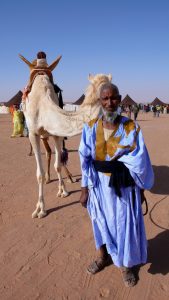
Many important lasting security struggles around the world, and especially on the African continent, are repeatedly overshadowed by other singular or flaring crises or by extraordinary natural disasters. In the case of the indigenous peoples of the Western Sahara, the Sahrawis, their struggle to regain their territory lost during colonial times is an ongoing conflict hardly ever mentioned in International News. Ever since Spain withdrew from the region in 1976 with no clear plan for the transition of power, Western Sahara, located in the North-West region of the African continent, has been contested by the Sahrawi Arab Democratic Republic (SADR) led by the Polisario Front, a national liberation movement fighting for independence of Western Sahara, against Morocco for over 45 years.1 Morocco claims ownership over Western Sahara from before Spain colonized it in 1884, and the Polisario Front advocates for territorial sovereignty belonging to the region’s indigenous population, the Sahrawis.2 & 3 The ceasefire established in 1991 led to a stalemate between Morocco and the Polisario Front; however, after almost twenty years, the Polisario Front broke the ceasefire, calling for a complete withdrawal of Moroccan troops from the Western Sahara.4 The conflict over the Western Sahara territory “had disastrous human, economic, and political consequences across Northern Africa,” even before the most recent violations of the ceasefire.5 Thousands of Sahrawis are displaced from their homes, and the estimates reach upwards of 170,000 people who had to flee the violence.6
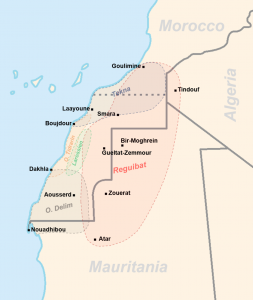
Displaced Sahrawis are living in refugee camps within the Tindouf Province of Algeria, and are facing harsh conditions of exile, isolation, and poverty.7 Under international law, the Sahrawis living under the control of the Polisario Front bear the burden and implications of statelessness, with thousands killed because of the lack of protection.8 & 9
The Sahrawis have a rich and profound cultural and religious history, including a mix of various cultures and ethnicities. The Sahrawis are traditionally nomadic Berbers, yet distinct from Berber Tuareg nomads in the east, Arab, and black African descent.10 The period of Spanish colonization brought many Spanish traditions to the Sahrawis, even having Sahrawi youths above the age of 13 live and study with Spanish host families.11 Sahrawis, like Moroccans, practice Sunni Islam, practiced by 99.9% of the population. However, although most of the population of Western Sahara practices Sunni Islam, there are small minority Christian groups, such as Moroccan Christians and foreign Roman Catholics, as well as non-Muslim foreigners who work in the UN Mission for the Referendum in Western Sahara.12 The Polisario Front also claims to uphold a secular governance approach; however, “more recently there had been “rapprochement of some elements of the Polisario with Islamist terrorism.”13
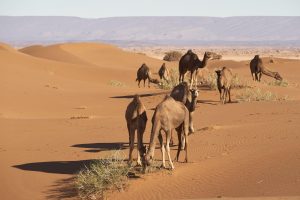
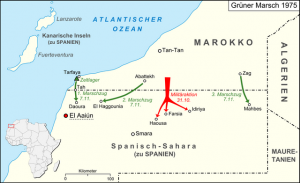
The Green March was a mass mobilization into the Western Sahara of 350,000 Moroccans that lasted four days, including over 300,000 Moroccan citizens, over 40,000 government officials, and King Hassan II claimed everyone who participated volunteered.23 King Hassan II also deployed troops “along the northwest region of Western Sahara… to fend off any external interference from other African countries.”24 With the complete removal of Spain from the Western Sahara, Morocco and Mauritania joined forces against the Polisario Front, who were supported by Libya and Algeria, and the Western Sahara War commenced.25 The Western Sahara War carried on from 1975 to 1991, and in 1979, Mauritania withdrew from the conflict, signed a peace treaty with the Polisario Front, and recognized the SADR.26 Although Morocco and the Polisario Front established a ceasefire in 1991, and France recognized Morocco’s claim of sovereignty over Western Sahara in July 2024, tensions between Morocco, the Polisario Front, and the Sahrawis were still brewing, which led to the end of the ceasefire in 2020.27
Security challenges have persisted since the conflict over Western Sahara began. The presence of natural resources in the Western Sahara stood at the heart of the fierce altercations and motivated the Spanish colonization. The Western Sahara holds a considerable amount of phosphorus, so much so that in 2018 alone, Morocco shipped over 1.9 million tonnes of phosphate out of Western Sahara, estimated at over $160 million.28 Under Morocco’s state-owned company “OCP SA,” Morocco has held steady control over the Bou Craa mine, which holds most of Western Sahara’s phosphorus deposits.29 Morocco has controlled the Bou Craa mine for almost 50 years since Spain withdrew from the region in 1976.30 The Sahrawis have “consistently protested the trade, ” claiming the territory rightfully belongs to them.31
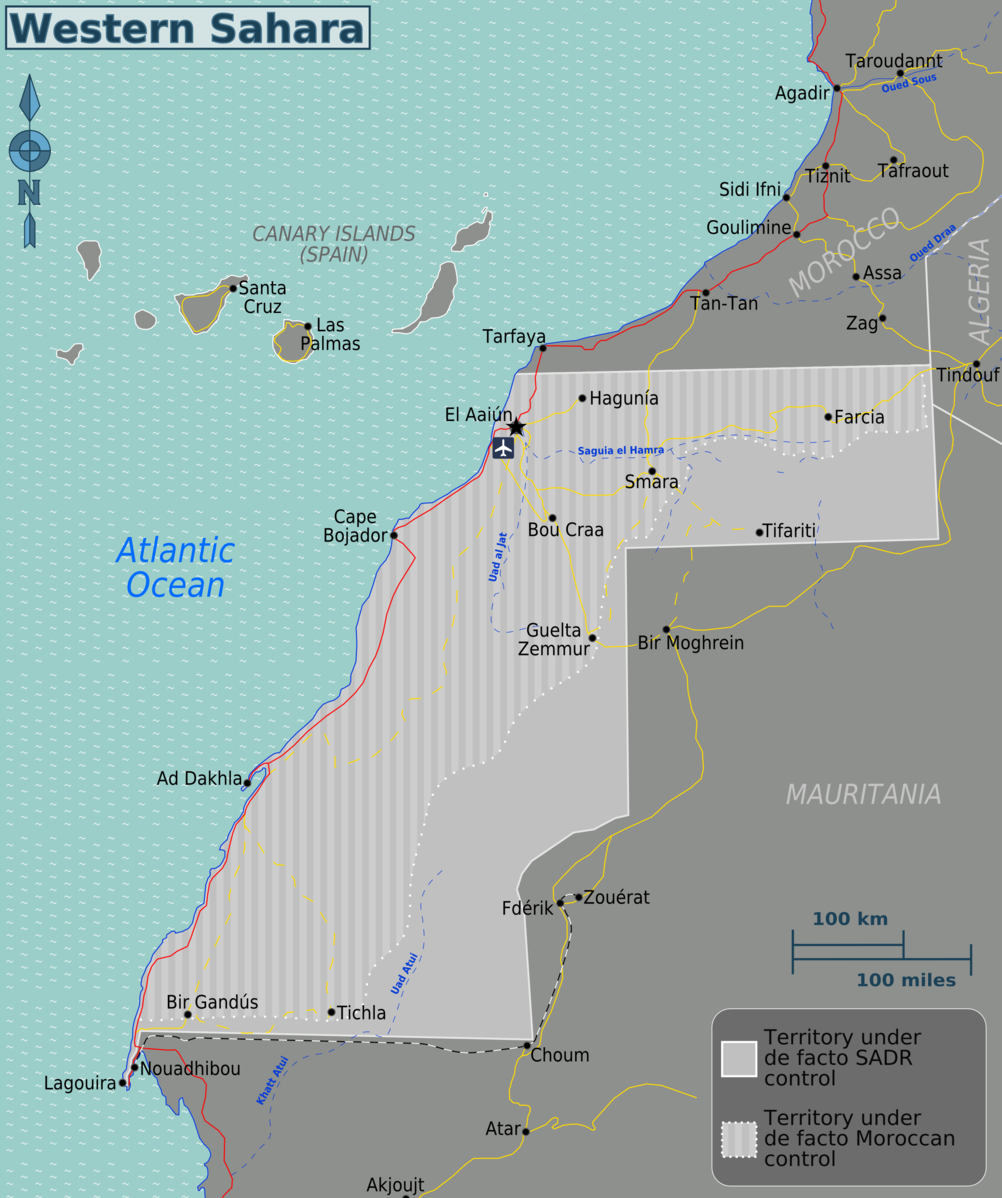
With the breakdown of the 1991 ceasefire agreement by the Polisario Front and the return of active violence, more security issues continue to arise. Although the Polisario Front has returned to its armed campaign, the Sahrawis have been broadly supporting the offensive measures because of the ineffective peace process led by the United Nations, and even pressuring the Polisario Front to use force to alter the status quo.32 With over 170,000 Sahrawis living in the refugee camps of Tindouf, Algeria, they are eager to see the Polisario Front resist against not only Morocco, but even “international calls to de-escalate the conflict and return to negotiations.”33 Furthermore, the Polisario Front’s leaders are now facing a generational transition, with many of the leaders well into their 60s and 70s, causing further challenges for the resistance group.34
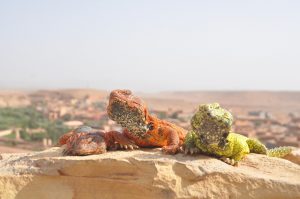
The Sahrawis anchor their culture in traditions passed from generation to generation through oral storytelling. Yet, technology has inserted a new dimension into the conflict over the past decade in the area of cyber warfare. Today’s conflicts require not only a boots-on-the-ground approach, but also prioritizing one’s defenses for the digital space, a key target for many nations and most vulnerable to incursion by hacktivist groups. In terms of the Western Saharan conflict, pro-Algerian hacktivist groups took on the digital playing field and launched cyber attacks at Morocco.40 The cyber attacks include “(Distributed Denial of Service) (DDoS) attacks, data theft and leaks, and website defacement.”41 There have also been cyber attacks that have specifically targeted Moroccan and Western Saharan activists.42 A new mobile malware known as “Starry Addax,” which “pretends to be a variant of the Sahara Press Service app, run by a media agency associated with SADR,” has been uncovered by researchers of the “Cisco Talos and the Yahoo Advanced Cyber Threats Team.”43 & 44 The malware spreads through phishing attacks, steals sensitive information from victims’ devices, and tricks victims into downloading more malware, including ‘FlexStarling,’ “a versatile Android Trojan that… allows the attacker to control infected devices.”45 & 46 Drone strikes have also emerged due to the escalation of this digital fight.
The conflict has already taken lives on both sides. A Sahrawi military leader was killed in a drone strike in April 2021, several Sahrawi fighters and a Polisario Front commander were killed in October 2023, and the Polisario Front fired rockets into the Al-Mahbes, a UN-monitored buffer zone in Western Sahara, in October 2024.47 & 48 In the neighboring Sahel region, levels of terrorist attacks, recruitment of youth, and support for military coups have infected all bordering countries to the east and south. The Sahel region spans from North-East Africa, Eritrea, to North-West Africa, Senegal, and partially into Mauritania, which both border Western Sahara.49 The growing level of terrorism in this part of Africa, more particularly, the adjacent Western region, poses significant security challenges for Western Sahara and its regional instability. With Western Sahara currently amidst a major conflict between the Polisario Front and Morocco, and the region not recognized as an independent state, but instead “a Non-Self-Governing Territory lacking any administrative power,” it creates a security vacuum that terrorist groups within the Sahel region might want to exploit.50 & 51 Terrorist groups such as the Islamic State in the Greater Sahara (ISGS) and the Islamic State in the West African Province (ISWAP) could capitalize on the security vacuum in Western Sahara and form shifting alliances to gain control of it.52 This national and human security risk only exacerbates the safety and predicaments the Sahrawis currently face.
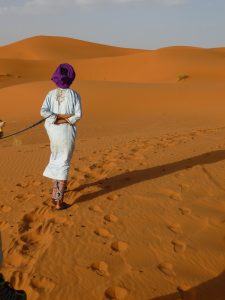
- Chograni, H. (2021, June 22). The Polisario Front, Morocco, and the Western Sahara Conflict. Arab Center Washington DC. https://arabcenterdc.org/resource/the-polisario-front-morocco-and-the-western-sahara-conflict/. ↵
- BBC. (2018, May 14). Western Sahara profile. BBC News. https://www.bbc.com/news/world-africa-14115273. ↵
- Chograni, H. (2021, June 22). The Polisario Front, Morocco, and the Western Sahara Conflict. Arab Center Washington DC. https://arabcenterdc.org/resource/the-polisario-front-morocco-and-the-western-sahara-conflict/. ↵
- Chograni, H. (2021, June 22). The Polisario Front, Morocco, and the Western Sahara Conflict. Arab Center Washington DC, retrieved 3/30/2025, https://arabcenterdc.org/resource/the-polisario-front- morocco-and-the-western-sahara-conflict/. ↵
- Boukhars, A. (2024). Western Sahara: Beyond Complacency. Carnegie Endowment for International Peace. https://carnegieendowment.org/posts/2013/10/western-sahara-beyond-complacency?lang=en. ↵
- The end of the ceasefire in Western Sahara. (2021). IISS. https://www.iiss.org/publications/strategic-comments/2021/the-end-of-the-ceasefire-in-western-sahara/. ↵
- Western Sahara: The Cost of the Conflict. (2007, June 11). Crisis Group. https://www.crisisgroup.org/middle-east-north-africa/north-africa/western-sahara/western-sahara-cost-conflict. ↵
- Marilyn, A. (2024). The right to nationality of the Saharawis and their legal identity documents. Citizenship Studies, 1–19. https://doi.org/10.1080/13621025.2024.2321722. ↵
- 36. Morocco/Western Sahara (1976-present). (n.d.). Uca.edu. https://uca.edu/politicalscience/home/research-projects/dadm-project/middle-eastnorth-africapersian-gulf-region/moroccopolisario-front-1976-present/. ↵
- Saharawis in Morocco. (n.d.). Minority Rights Group. https://minorityrights.org/communities/saharawis/. ↵
- Reis, R. (2024, November 18). Western Sahara’s Sahrawi Refugees Face an Uncertain Future after 50 Years of Exile. Migrationpolicy.org. https://www.migrationpolicy.org/article/western-sahara-sahrawi-refugees. ↵
- Davis, B. (2020, January 27). Educator of the Faithful: The Power of Moroccan Islam | Hudson. Www.hudson.org. https://www.hudson.org/national-security-defense/educator-of-the-faithful-the-power-of-moroccan-islam. ↵
- Pham, J. P. (2010). Not Another Failed State: Toward a Realistic Solution in the Western Sahara. The Journal of the Middle East and Africa, 1(1), 1–24. https://doi.org/10.1080/21520841003741463. ↵
- Morocco – Countries – Office of the Historian. (2020). State.gov. https://history.state.gov/countries/morocco. ↵
- Britannica. (2019). Western Sahara | Facts, History, & Map | Britannica. In Encyclopædia Britannica. https://www.britannica.com/place/Western-Sahara. ↵
- Britannica. (2019). Western Sahara | Facts, History, & Map | Britannica. In Encyclopædia Britannica. https://www.britannica.com/place/Western-Sahara. ↵
- Britannica. (2019). Western Sahara | Facts, History, & Map | Britannica. In Encyclopædia Britannica. https://www.britannica.com/place/Western-Sahara. ↵
- Giniger, H. (1975, November 15). Morocco and Mauritania In the Sahara Pact With Spain. The New York Times. https://www.nytimes.com/1975/11/15/archives/morocco-and-mauritania-in-sahara-pact-with-spain-madrid-agrees-to.html. ↵
- Parrilli, F. (2021). Sahrawi: An Endless Struggle for Independence and Freedom. Themigrationnews.com. https://www.themigrationnews.com/news/sahrawi-an-endless-struggle-for-independence-and-freedom/. ↵
- Parrilli, F. (2021). Sahrawi: An Endless Struggle for Independence and Freedom. Themigrationnews.com. https://www.themigrationnews.com/news/sahrawi-an-endless-struggle-for-independence-and-freedom/. ↵
- Corby, E. (2011, April 17). Moroccans march into Western Sahara in the Green March, 1975 | Global Nonviolent Action Database. Nvdatabase.swarthmore.edu. https://nvdatabase.swarthmore.edu/content/moroccans-march-western-sahara-green-march-1975. ↵
- Corby, E. (2011, April 17). Moroccans march into Western Sahara in the Green March, 1975 | Global Nonviolent Action Database. Nvdatabase.swarthmore.edu. https://nvdatabase.swarthmore.edu/content/moroccans-march-western-sahara-green-march-1975. ↵
- Corby, E. (2011, April 17). Moroccans march into Western Sahara in the Green March, 1975 | Global Nonviolent Action Database. Nvdatabase.swarthmore.edu. https://nvdatabase.swarthmore.edu/content/moroccans-march-western-sahara-green-march-1975. ↵
- Corby, E. (2011, April 17). Moroccans march into Western Sahara in the Green March, 1975 | Global Nonviolent Action Database. Nvdatabase.swarthmore.edu. https://nvdatabase.swarthmore.edu/content/moroccans-march-western-sahara-green-march-1975. ↵
- Zunes, S., & Mundy, J. (2010). Western Sahara: War, Nationalism, and Conflict Irresolution (p. 9). Syracuse University Press. https://doi.org/10.2307/j.ctt1j2n9vz. ↵
- Chograni, H. (2021, June 22). The Polisario Front, Morocco, and the Western Sahara Conflict. Arab Center Washington DC. https://arabcenterdc.org/resource/the-polisario-front-morocco-and-the-western-sahara-conflict/. ↵
- Chograni, H. (2021, June 22). The Polisario Front, Morocco, and the Western Sahara Conflict. Arab Center Washington DC. https://arabcenterdc.org/resource/the-polisario-front-morocco-and-the-western-sahara-conflict/. ↵
- Western Sahara Resource Watch | New report on Western Sahara phosphate industry out now. (2019). Wsrw.org. https://wsrw.org/en/archive/4497. ↵
- Western Sahara Resource Watch | The conflict phosphates – four decades of plunder. (2023). Wsrw.org. https://wsrw.org/en/news/the-phosphate-exports. ↵
- Spain, Morocco, & Mauritania. Madrid Accords. (1975). ↵
- Western Sahara Resource Watch | The conflict phosphates – four decades of plunder. (2023). Wsrw.org. https://wsrw.org/en/news/the-phosphate-exports. ↵
- The end of the ceasefire in Western Sahara. (2021). IISS. https://www.iiss.org/publications/strategic-comments/2021/the-end-of-the-ceasefire-in-western-sahara/. ↵
- The end of the ceasefire in Western Sahara. (2021). IISS. https://www.iiss.org/publications/strategic-comments/2021/the-end-of-the-ceasefire-in-western-sahara/. ↵
- The end of the ceasefire in Western Sahara. (2021). IISS. https://www.iiss.org/publications/strategic-comments/2021/the-end-of-the-ceasefire-in-western-sahara/. ↵
- Kushner, J., & Cheng, K.-C. (2024). Morocco’s War Against the Sahrawi. Pulitzer Center. https://pulitzercenter.org/stories/moroccos-war-against-sahrawi. ↵
- Kushner, J., & Cheng, K.-C. (2024). Morocco’s War Against the Sahrawi. Pulitzer Center. https://pulitzercenter.org/stories/moroccos-war-against-sahrawi. ↵
- Kushner, J., & Cheng, K.-C. (2024). Morocco’s War Against the Sahrawi. Pulitzer Center. https://pulitzercenter.org/stories/moroccos-war-against-sahrawi. ↵
- Fabiani, R. (2023, July 20). Paving the Way to Talks on Western Sahara. Www.crisisgroup.org. https://www.crisisgroup.org/middle-east-north-africa/north-africa/western-sahara/paving-way-talks-western-sahara. ↵
- Reuters Staff. (2024, September 26). Algeria reimposes visa requirements on Moroccan nationals. Reuters. https://www.reuters.com/world/africa/algeria-reimposes-visa-requirements-moroccan-nationals-2024-09-26/. ↵
- Decoding Cyberattacks on Morocco – CYFIRMA. (2024). CYFIRMA. https://www.cyfirma.com/research/decoding-cyberattacks-on-morocco/. ↵
- Decoding Cyberattacks on Morocco – CYFIRMA. (2024). CYFIRMA. https://www.cyfirma.com/research/decoding-cyberattacks-on-morocco/. ↵
- Martin, A. (2020). Human rights activists in Western Sahara are being targeted by mobile malware. Therecord.media. https://therecord.media/android-mobile-spyware-western-sahara. ↵
- Martin, A. (2020). Human rights activists in Western Sahara are being targeted by mobile malware. Therecord.media. https://therecord.media/android-mobile-spyware-western-sahara. ↵
- Martin, A. (2020). Human rights activists in Western Sahara are being targeted by mobile malware. Therecord.media. https://therecord.media/android-mobile-spyware-western-sahara. ↵
- Decoding Cyberattacks on Morocco – CYFIRMA. (2024). CYFIRMA. https://www.cyfirma.com/research/decoding-cyberattacks-on-morocco/. ↵
- Decoding Cyberattacks on Morocco – CYFIRMA. (2024). CYFIRMA. https://www.cyfirma.com/research/decoding-cyberattacks-on-morocco/. ↵
- Presse, F. (2023, September). Polisario Commander, Western Sahara Fighters Killed By Drone. Barrons; Barrons. https://www.barrons.com/news/polisario-commander-western-sahara-fighters-killed-by-drone-c9d967fa. ↵
- Yabiladi.com. (2024, November 10). Polisario attacks civilians with projectiles in Al Mahbes. Yabiladi.com. https://en.yabiladi.com/articles/details/156093/polisario-attacks-civilians-with-projectiles.html. ↵
- Center for Preventive Action. (2024, October 23). Violent Extremism in the Sahel. Global Conflict Tracker. https://www.cfr.org/global-conflict-tracker/conflict/violent-extremism-sahel. ↵
- Kushner, J., & Cheng, K.-C. (2024). Morocco’s War Against the Sahrawi. Pulitzer Center. https://pulitzercenter.org/stories/moroccos-war-against-sahrawi. ↵
- Center for Preventive Action. (2024, October 23). Violent Extremism in the Sahel. Global Conflict Tracker. https://www.cfr.org/global-conflict-tracker/conflict/violent-extremism-sahel. ↵
- Center for Preventive Action. (2024, October 23). Violent Extremism in the Sahel. Global Conflict Tracker. https://www.cfr.org/global-conflict-tracker/conflict/violent-extremism-sahel. ↵
- MINURSO. (2025). United Nations Peacekeeping. http://peacekeeping.un.org/en/mission/minurso. ↵
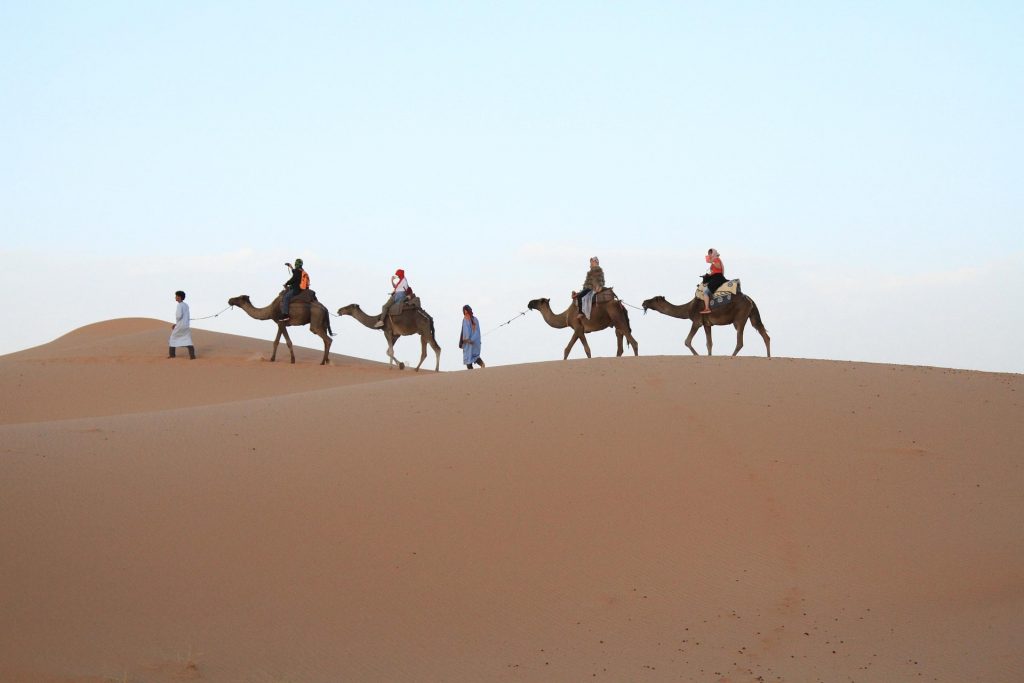



53 comments
Rebecca Amaya
I find it interesting that Morocco’s occupation of Western Sahara has continued with limited international intervention. What makes it more surprising is that there has been a prolonged territorial conflict that seems to be ignored. In spite of this conflict, Morocco has continued to gain geopolitical leverage through diplomatic agreements. The part that most resonates with me is the resilience of the Sahrawi people in refugee camps or in occupied territiories, where their identity endures through dignity in contrast to global indifference. What opportunities remain for the Sahrawi people to achieve autonomy/statehood without large scale violence?
Teagan McSherry
It was surprising to learn that the Western Sahara conflict is one of Africa’s longest-running territorial disputes, yet it remains relatively unknown on the global stage. The article’s emphasis on the human impact of the conflict resonated deeply. This narrative emphasizes the voices of those affected, highlighting their resilience and the urgent need for a lasting resolution. How do you think increased international awareness could influence the prospects for a peaceful resolution to this conflict?
Sarah
Daniel, your work here is comprehensive and interesting as always! I’m super unfamiliar with Western Sahara. I had the opportunity to visit Morocco last year, which was a great experience for me. So I was surprised to hear about the human rights abuses committed by Morocco. I was always inspired by the Green March and surprised that I never heard of it before! My question is, what role do you think former colonial powers (Spain and France) should serve in helping repair damages in countries that they used to occupy?
Carollann Serafin
1) The most interesting portion of this article was learning about the conflict that occurred between the digital threats and the cyber warfare and how technology more on the modern side affected the people.
2) I feel that with technological advancement we can often overlook how much things are evolving
3) i would want to know what your inspiration was when writing this and do you feel you got your point across
overall this was amazing!
TJ
The essay gives a strong overview of the conflict in Western Sahara, showing how it began with colonization and continues today with Morocco’s control of the region. It explains the role of the Sahrawi people and their fight for independence, as well as the international response. The writer highlights how this is more than just a local issue and connects it to ideas like self-determination and human rights, making the topic feel relevant and important.
Cynthia Brehm
What I found interesting about the article is what you mentioned from the onset “… [T]he indigenous peoples of the Western Sahara, the Sahrawis, [and] their struggle to regain their territory lost during colonial times…” This is the heart of the matter when you step back and examine it. Morocco has no legitimate claim to the Western Sahara, and neither does Mauritania. This was decided by the ICJ:
“…, the General Assembly has recognized the right of the people of Western Sahara to exercise free and genuine self-determination; (emphasis added) and that the application of self-determination in the framework of such consultation has been accepted by the administering Power and supported by regional institutions and international conferences, as well as endorsed by the countries of the area” (ICCJ, 1975).
Morocco may claim historical ties predating colonization, but the Sahrawis’ tell a different story and the ICJ ruling confirms their right to decide their own future.
In my research, I discovered the Western Sahara is rich in natural resources. As McGregor explains, “…[T]he Western Sahara’s resources, [include] phosphates, fisheries and, potentially, oil and gas” (McGregor, 2013). In my opinion, Morocco saw Western Sahara a vulnerable target for expansionism, and resource exploitation at the expense of their neighbors.
Do you agree with my analysis or not?
Bibliography
ICCJ. (1975, October 16). Advisory Opinion of 16 October 1975 | INTERNATIONAL COURT OF JUSTICE. Icj-Cij.org; United Nations. https://www.icj-cij.org/index.php/node/103758
McGregor, A. (2013, December 3). Oil Exploration and Political Stalemate Threaten to Trigger Renewed Conflict in the Western Sahara. Jamestown.org; The Jamestown Foundation, Global Research and Analysis. https://jamestown.org/program/oil-exploration-and-political-stalemate-threaten-to-trigger-renewed-conflict-in-the-western-sahara/
Lashanna Hill
What was unexpected to me in learning about their security challenges was the displacements and overshadowing of the Sahrawis making them refugees. The best part of the story that resonated with me was how the indigenous people are not able to reclaim their land post Spain colonial era because of contested land attempts by neighboring states.
What caused the International Court of Justice in the Hague to rule that indigenous people have the right to self rule?
Jesse Turnquist
Very well-written article about the Western Sahara. What surprised me the most was the cyber warfare and digital threats that play a role in the region. It will be interesting to see how it plays out and how human rights may shape the region. The situation is beginning to intensify, with more advanced military equipment being brought in. What do you see happening in the future? While there have been violations of human rights, will any international action be able to stop further violations?
Mia Ramirez
What I was not expecting to learn about was the ongoing conflict over the control and ownership of Western Sahara. What was interesting to learn about the conflict is the disputes over valuable natural resources. The best part of what I learned from this article was the link between resource wealth and political conflict. What resonated with me the most was the economic exploitation by Morocco, a company called OCP SA which controls the phosphate mines. My question: since the Western Sahara conflict combines human rights violations, issues of statelessness, etc. how should the country work through it?
Karicia Gallegos
Something that was unexpected to me in learning about the security challenges this country faces was the role of cyber warfare in the Western Sahara conflict. The part of this story that most resonated with me was the resilience of the Sahrawi people despite decades of displacement because their cultural strength demonstrated a deep sense of identity. A question I would ask is how do you think international recognition of Morocco’s sovereignty by countries like the United States affects the future of Sahrawi autonomy?